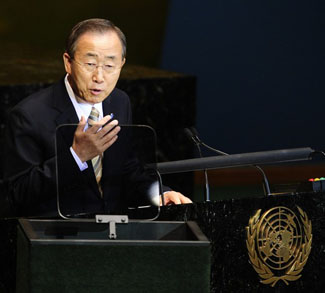It’s about time for a frank discussion about the concept of humanitarianism through the barrel of a gun and whether it’s a boon or a bane to international society and human rights as a whole.
This article is not about the hypocrisy, true goals, or real motivations underpinning the UN-sanctioned ‘no-fly zone’ over Libya, indeed the internet already serves as a shrill arena for thousands of such polemics. Instead, it ventures to ask a simple question: do humanitarian interventions even work?
The top layer is the military question- the practical considerations. A humanitarian intervention will always be an incredibly costly affair, even if one ignores the long-term costs of maintaining a military capable of global force projection. For some perspective, it has cost the government of Canada around $10.5 billion to deploy military assets in Afghanistan for 6 years. The United States on the other hand has spent over $400 billion on deployments in Afghanistan since the conflict began. While some may argue about Afghanistan being classified as a humanitarian intervention, everyone can agree that it serves as a good yardstick in regards to expensive sustained military operations can be over an extended period of time. It also serves as a good yardstick of how difficult it is to build a nation of human rights-loving citizens via a prolonged military occupation.
That humanitarian interventions are expensive could be forgivable if they actually worked. But they don’t. One needs look no further than Afghanistan, Iraq, or Libya to see how inefficient and ultimately damaging the concept of a humanitarian intervention is. Those who would classify Iraq as a success story would be wise to refer to classified documents recently released by Wikileaks that reveal a body count of over 104,000 Iraqis between 2003 and 2006. Thus to say Iraq ‘worked’ in a humanitarian sense is to argue that it’s somehow worth it to kill 104,000 people in order to save a hypothetical number of other people, as well as an idea that still finds itself on life support. And on the subject of this idea, if the present government of Iraq is destined to move forward and become a parable of legalistic respect for human rights (the biggest if there ever was), the fact will forever remain that its mandate is drenched in blood.
The reason why humanitarian interventions don’t work is amusing because it’s so simple yet it evades even the most moustached of CNN roundtable experts. Basically, people don’t like being bombed. The Achilles heel of a humanitarian intervention is that it takes a regime that is hated by the masses and risks infusing it with mass nationalist appeal. The us-VS-them neo-imperialism card is somewhat of a trump and it will remain as such for a long time given West’s dodgy track-record of selective human rights enforcement.
So a humanitarian intervention is expensive and it doesn’t work, but that’s just looking at it from a practicality standpoint. The concept of a humanitarian intervention is also morally compromised. Right now, Syria is the yin to Libya’s yang. Strongman government, check, dead protestors, check, tanks, check; though nary a Western warplane to be found in the night sky. And therein lies the problem: for humanitarian interventions to pass the moral litmus test, the standard absolutely needs to be applied uniformly. Though ultimately, this is probably a good thing because applying an expensive and military ruinous policy across the board simply for the sake of moral purity wouldn’t be a step in the right direction.
Since the standard isn’t and never will be applied uniformly, all humanitarian interventions are destined to be branded as hypocrisy. This logic loop effectively prints out the neo-imperialism card and lovingly places it in the hand of every would-be target of a humanitarian intervention. Selective application effectively blocks all of us off from ever being able to enjoy the moral high road.
And here we arrive at the paradox of Western human rights: they’re universal enough to serve as justification for killing people, yet we refuse to commit ourselves fully to their messianic power. In other words, if the Western conception of human rights is a ‘truth’ that can be laid roughshod over the whole byzantine fabric of global culture, then people in the West also must trust that it is a process that will develop naturally and without any need for corrective carpet bombing.
The opinions, beliefs, and viewpoints expressed by the authors are theirs alone and don’t reflect any official position of Geopoliticalmonitor.com.




